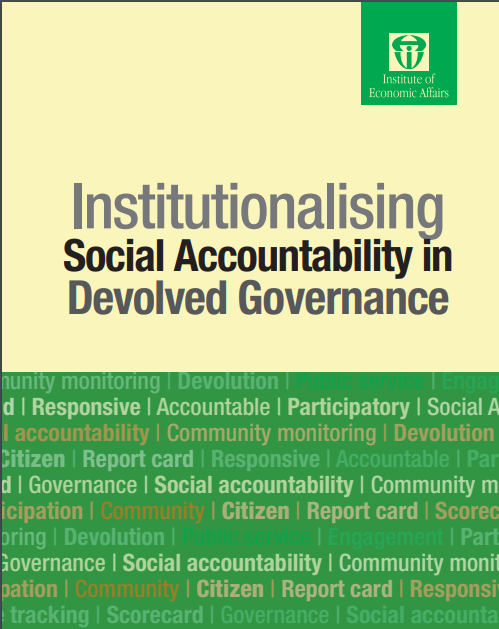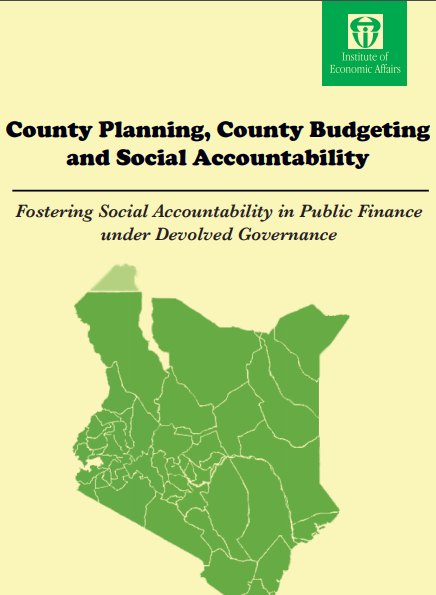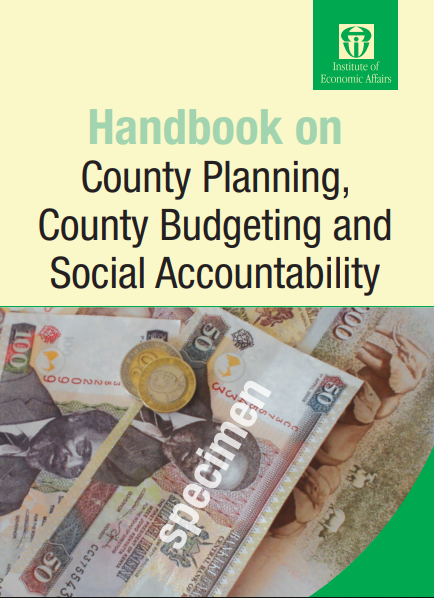Location
The Institute of Economic Affairs (IEA Kenya) is a think-tank that provides a platform for informed discussions in order to influence public policy in Kenya. We seek to promote pluralism of ideas through open, active and informed debate on public policy issues. We undertake research and conduct public education on key economic and topical issues in public affairs in Kenya and the region, and utilize the outcomes of the research for policy dialogue and to influence policy making.
Mission
To inform decision-making in Kenya through policy innovation, research, analysis and dialogues.
Vision
A prosperous Kenya that has a well managed economy and that upholds constitutional principles of governance.
Core Values
Our core values drive IEA Kenya’s mission as we strive to uphold the highest ethical standards in our work:
Professional integrity. We discharge our duties diligently and in line with nationally and internationally recognized ethical and professional standards. Further, we uphold honesty, transparency, reliability and consistency in all our decisions and actions.
Innovation. We are committed to continuous learning and improvement in how we do our work. We produce high quality policy and research products and outputs by encouraging and supporting positive critique, new ideas, tools, methods and techniques in policy analysis, research, planning and capacity building.
Initiative. We believe in initiative as value for encouraging and developing leadership in our organization. We encourage staff to learn to work without supervision and for individuals to be the first in identifying an opportunity and taking appropriate action.
Inclusiveness. We are an inclusive organization where differing points of view and experiences are valued as opportunities for mutual learning.
Members:
Resources
Displaying 1 - 5 of 6Institutionalising Social Accountability in Institute of Economic Affairs Devolved Governance
This handbook provides reference material for stakeholders in devolved governance, including policy makers at the county level and citizens, on social accountability and its relevance in devolved governance and the attainment of the objects of Kenya’s devolution as highlighted in Article 174 of the Constitution of Kenya 2010.
Review of status of Public Participation, and County Information Dissemination Frameworks
Meaningful citizen participation in governance is a key ingredient for public reforms that were instituted by the Constitution of Kenya (CoK) 2010. Article 1 (1) of the Constitution vests all sovereign power to the people of Kenya. This power can be expressed through direct participation or indirectly through elected representatives. In addition, various pieces of legislations anchoring devolution highlight the principles of citizen participation. Together, these constitutional and legislative provisions avail various platforms for citizen participation in devolved governance.
County Planning, County Budgeting and Social Accountability
The constitution of Kenya 2010 established a devolved system of governance with 47 County governments. The constitution in schedule four also transfers service delivery in health, water and agriculture sector among other functions to county governments.
Handbook on County Planning, County Budgeting and Social Accountability
Devolution is one form of decentralization. Decentralization is defined as the process of dispersing power from the centre to lower levels of government. The other forms of decentralization include de-concentration, delegation and privatization. De-concentration transfers implementation powers to lower regions or sub- national units that implement decisions made at the centre. The responsibility for service delivery and decision making under delegation is passed to semiindependent territorial or sub-national units.
Reassessing Kenya's land reform
This article discusses issues surrounding land reform in Kenya. As the nature of land reforms is as yet undecided, disparate suggestions and proposals are being considered. These include:Land Ownership Ceilings. There are vast inequalities in land ownership. Indeed, non-indigenous Kenyans or corporations that are not significantly Kenyan own the largest consolidated quantities of Kenyan lands. Ceilings on land ownership, would encourage more equitable distribution of land, perhaps facilitating more effective production and a reduction in food security problems.






